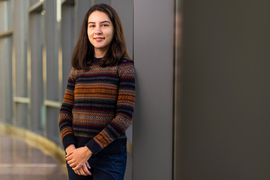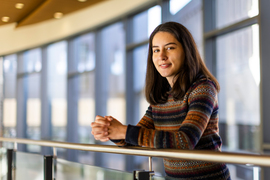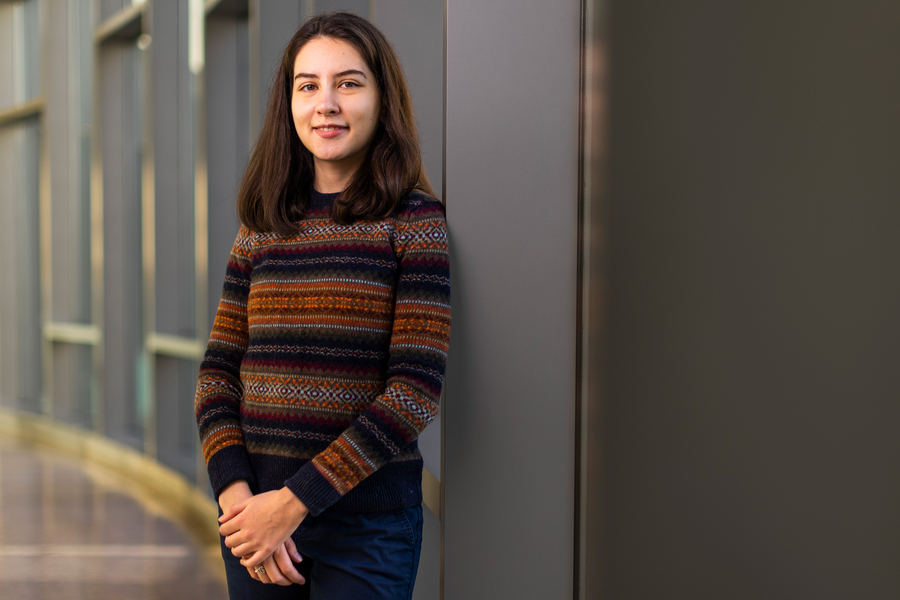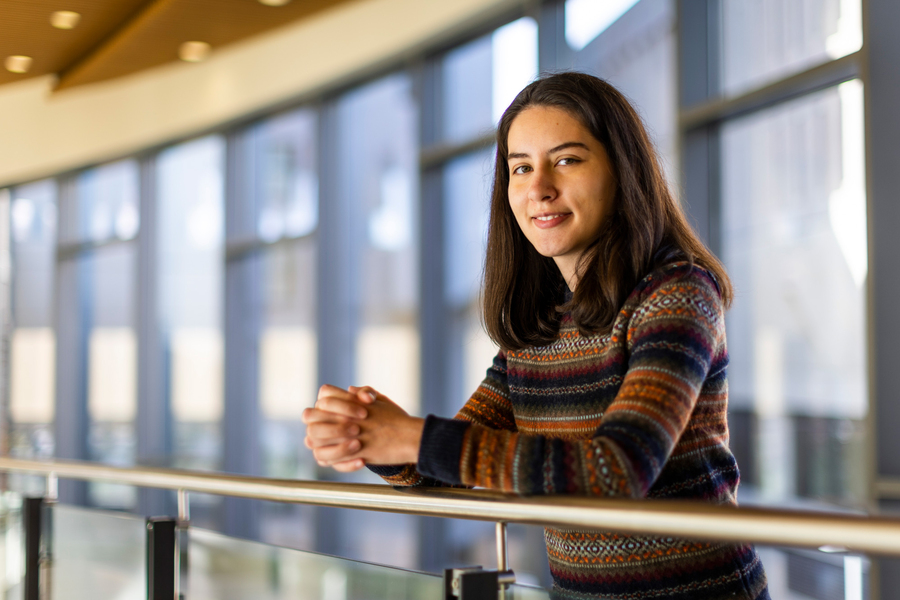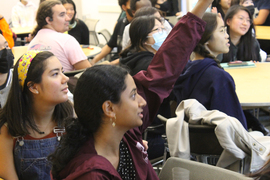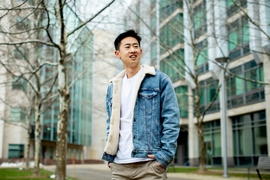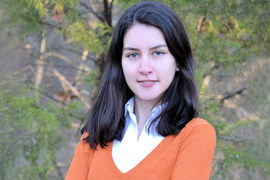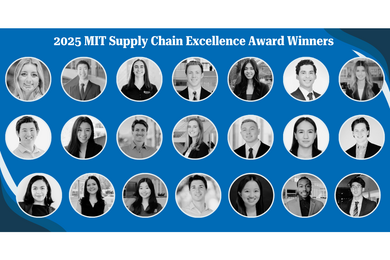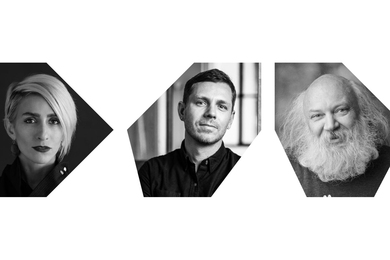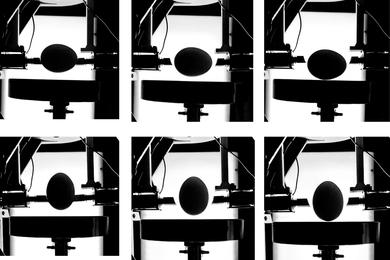From a young age, Valeria Robayo has taken the lead in her own education. At age 3, her family moved from Bogotá, Colombia, to Houston, Texas, to seek better opportunities for Robayo, and later, her sister. She spent summer days at the local library while her parents worked to support the family. Her parents, who were teachers, encouraged her to make her own lesson plans and study what was interesting to her.
“Some of the books that attracted me the most in the library were the anatomy textbooks,” says Robayo. “At that time, my dad was putting off an elective knee surgery, having to endure significant pain as we couldn’t afford the medical bills. There was a part of me that wanted to see what was going on with his knee, so I would look at the anatomy of that.”
That experience sparked an interest in medicine, and Robayo describes it as her “first step in a very long journey.” In high school, Robayo took a class where she had the opportunity to shadow more than 40 different departments at her local hospital.
“Back then I was still narrowing down my career interests,” says Robayo. “I was really interested in medicine because it employs science to serve others. I also realized that medicine is a system and not just a patient-doctor interaction. Pursuing medicine as a career would allow me to combine my interests in science and also provide a service to my community.”
The people-centered aspect of medicine informs Robayo’s choice of study at MIT, where she majors in management with a minor in biology and German. To some, her major might come as a surprise for someone in the midst of applying to medical school, but Robayo sees things differently.
“I wanted to pursue something that would allow me to get a practical perspective while strengthening my scientific foundations before going to medical school. I really wanted a college with a business or management undergraduate major,” says Robayo, noting that the MIT Sloan School of Management was a big factor in her college decision. “I wanted somewhere where research was really supported and where the culture of students was really creative. MIT has the perfect combination of that.”
Robayo has followed through on her desire for a well-rounded perspective throughout her time at MIT. She has pursued wet lab research through the Undergraduate Research Opportunities Program, and research in shared decision-making at Massachusetts General Hospital, honing both her technical and people skills. She has also interned with the U.S. Government Accountability Office through the MIT Washington summer internship program, contributing to an audit of the Veteran’s Health Administration and gaining an understanding of how policy affects medicine in the U.S.
Her most ambitious project to date is Resource Hub, a nonprofit she founded in the summer of 2021. Drawing from her own experiences, and motivated by the challenges brought on by the Covid-19 pandemic, Resource Hub is a free online service that matches underserved community members with local services available to them.
“I wanted to build a project that combined my interests in management and medicine because I love learning experientially,” says Robayo. “It was inspired by both my personal experience growing up as an immigrant in the U.S. and struggling to find educational resources, and also from my shadowing experiences and realizing that a lot of patients were coming in with very serious illnesses that could have been prevented had they sought care and taken advantage of a lot of the resources available that they just didn’t know about because they were so busy, or because of language difficulties.”
Robayo was named a Reimagine Challenge winner for her efforts, and was also able to secure funding from the MIT Sandbox Innovation Fund to continue to grow Resource Hub.
Learning language to open doors
Although she knew from the beginning what her major would be, Robayo wasn’t certain about minoring in German until after she arrived at MIT. She had started learning the language in high school, choosing it because she foresaw potential career opportunities in Germany.
“There were many reasons for learning German,” Robayo says. “I speak Spanish and English and I wanted to learn a new language. I wanted it to help me further my career and also learn about a culture that I was interested in, and I noticed there were a lot of opportunities in Germany related to medicine, medical devices, things like that. I think it would just open a lot of doors for me.”
At first, Robayo was motivated to take German at MIT to fulfill the language requirement for MISTI, but she found herself loving the teaching staff and the style of the classes. Though her MISTI travel opportunity, scheduled for the summer of 2020, was ultimately canceled, Robayo has continued to study the language and culture, and was recently awarded a round-trip flight to Germany after winning first place in the MIT German Studies Excellence Award.
“Learning a language is a way to show respect for the culture that you’re working with,” says Robayo. “I’ve been able to meet a lot of great instructors and people throughout different things that I’ve done.”
Beyond taking a variety of classes in the Global Languages program, Robayo also founded the German Language Learners Club and has participated in the German American Conference at Harvard University. In the latter, she’s organized panels on artificial intelligence in medicine and intellectual property rights, and served as the organization’s Diversity Officer.
Looking ahead, Robayo is in the midst of applying to medical school, where she hopes to study to become a surgeon.
“I want to make sure I have an open mind,” says Robayo. When asked about her future plans, she speaks in broad strokes to fit the breadth of her ambitions.
“Definitely a job where I’m in the OR a lot, where I’m a doctor, a researcher, and a teacher, where I’m able to build relationships with people and work in teams to reach new levels of innovation, efficiency, and quality in health care. A career where I’m serving people both inside and outside of the clinic.
“Medicine is the study of people, both in terms of the human body and in terms of the relationships that you get to form with them. I’m just excited to take those next steps.”
